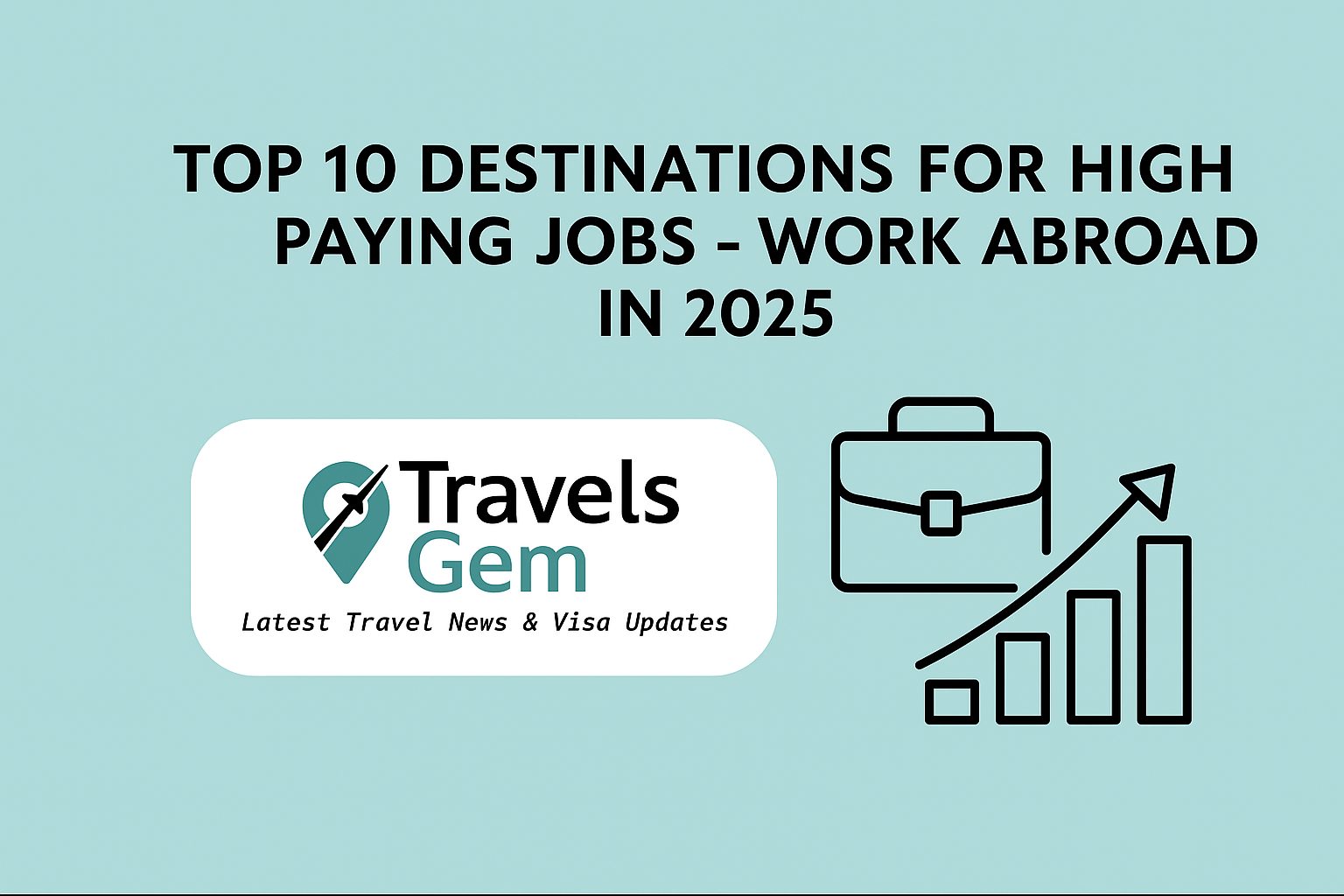As globalization reshapes the job market, working abroad in 2025 offers professionals unparalleled opportunities to boost their careers, earn competitive salaries, and immerse themselves in new cultures. With remote work expanding and countries competing to attract skilled talent, certain destinations stand out for their robust economies, high-paying jobs, and excellent quality of life. This article explores the top 10 countries for high-salary jobs in 2025, based on current economic trends, industry demands, and visa accessibility. From tech hubs to financial powerhouses, these nations provide diverse opportunities for expatriates seeking career growth and financial success.
1. Switzerland: A Haven for High Earners
Switzerland tops the list with an average monthly salary of approximately $8,111, driven by its strong finance, pharmaceutical, and tech sectors. Cities like Zurich and Geneva host global giants such as Nestlé, Roche, and UBS, offering lucrative roles for software engineers, financial analysts, and biotech researchers. The country’s low tax rates for high earners and exceptional quality of life, with a Happiness Index ranking of 9, make it a prime destination. However, the high cost of living—around $4,000 per month—requires careful financial planning. Switzerland’s Expertise Pass and relaxed visa policies for skilled professionals simplify relocation for IT specialists and healthcare workers.
2. United States: Diverse Opportunities, High Rewards
The United States remains a magnet for professionals, with an average monthly salary of $6,455. Its diverse economy supports high-paying jobs in technology, healthcare, and finance, particularly in cities like San Francisco, New York, and Seattle. Software developers, AI engineers, and neurosurgeons can earn upwards of $100,000 annually, with top roles like chief technology officers commanding even higher salaries. The U.S. boasts 25 universities in the QS World University Rankings 2025, making it ideal for recent graduates. While visa processes like the H-1B can be competitive, the country’s job market growth—projected at 0.7% annually—ensures ample opportunities.
3. Luxembourg: Small Nation, Big Paychecks
Luxembourg, a financial hub, offers an average monthly salary of $6,633, with banking, fintech, and space technologies driving demand. Skilled professionals, such as investment bankers and data scientists, can earn up to $7,433 monthly. The country’s multilingual workforce (French, German, Luxembourgish) and 75% immigrant labor force create a welcoming environment for expats. Luxembourg’s visa processes are straightforward, and its high livability score makes it attractive for families. The cost of living, around $2,800 monthly, is manageable given the salaries. The University of Luxembourg, ranked in the top 24% globally, supports career starters.
4. Denmark: Work-Life Balance and High Wages
Denmark’s average monthly salary of $6,127, coupled with a 35-hour workweek and five weeks of annual leave, makes it a standout for work-life balance. Key industries include renewable energy, biotechnology, and IT, with companies like Novo Nordisk and Maersk hiring data analysts and engineers. Copenhagen is a hub for startups, offering roles for AI specialists. High taxes are offset by free healthcare and education, and the country’s Happiness Index ranking of 2 ensures a fulfilling lifestyle. Denmark’s demand for skilled workers in science and transport simplifies visa access for professionals.
5. Canada: Welcoming and Lucrative
Canada offers an average monthly salary of $5,081, with thriving sectors in technology, healthcare, and natural resources. Toronto, Vancouver, and Ottawa are hotspots for IT professionals, with cybersecurity analysts earning around $81,000-$99,000 annually. The country’s Express Entry system and startup visas make immigration accessible, and its low crime rate and multicultural society enhance livability. The cost of living, approximately $1,344 monthly, is reasonable compared to salaries. Canada’s 2.3% annual IT job growth projection and government support for R&D attract software developers and engineers.
6. Australia: Vibrant Economy, High Salaries
Australia’s average monthly salary of $4,500 supports a high quality of life, with Sydney and Melbourne leading in tech, healthcare, and finance. Software engineers earn around $70,000-$90,000 annually, bolstered by companies like Atlassian and Canva. The country’s Skilled Migration Visa and working holiday visas ease entry for professionals in mining and construction. Despite a high cost of living ($2,000 monthly), Australia’s work-life balance, multicultural vibe, and Happiness Index ranking of 10 make it appealing. The tech sector’s 500+ startup deals in 2023 signal strong job growth.
7. Netherlands: Europe’s Startup Capital
With an average monthly salary of $5,019, the Netherlands excels in tech, finance, and logistics. Amsterdam and Rotterdam host startups and multinationals like Philips and Unilever, offering roles for cloud engineers and business consultants. The country’s 82.2% employment rate and 35-hour workweek ensure stability and balance. English proficiency (over 90% of the population) and relaxed visa policies, like the Orientation Year visa for graduates, make it accessible. The cost of living, $800-$1,000 monthly, is affordable, and the Happiness Index ranking of 5 adds to its allure.
8. Singapore: Asia’s Financial Hub
Singapore’s competitive salaries, averaging $4,500 monthly, and low tax rates attract professionals to its finance, tech, and trade sectors. Companies like Grab and DBS Bank hire AI engineers and financial analysts. The Expertise Pass and Overseas Networks visa programs streamline relocation for skilled workers. Singapore’s safety, modern infrastructure, and Happiness Index ranking of 30 make it ideal for singles and families. The cost of living, around $2,500 monthly, is balanced by high earnings and a business-friendly environment.
9. Germany: Engineering and Innovation Hub
Germany’s average monthly salary of $3,975 supports high-paying jobs in engineering, IT, and healthcare. Berlin, Munich, and Hamburg are hubs for Volkswagen, Bosch, and tech startups, with software developers earning $45,000-$55,000 annually. The country’s 77.3% employment rate and four-day workweek trials enhance appeal. Affordable healthcare and education, plus a Happiness Index ranking of 15, make it family-friendly. Germany’s STEM-friendly visa policies and graduate job search schemes ease entry, though German language skills boost prospects.
10. United Arab Emirates: Tax-Free Wealth
The UAE, particularly Dubai and Abu Dhabi, offers tax-free salaries averaging $4,558 monthly. High-demand roles in IT, engineering, and healthcare, such as chief information officers ($26,000 monthly), thrive. The UAE’s modern infrastructure and expat-friendly policies, like the Golden Visa, attract professionals. The cost of living, around $2,000 monthly, is offset by perks like relocation assistance. While the desert climate is a challenge, the UAE’s luxurious lifestyle and job market growth make it a top choice.
Key Considerations for Working Abroad
Before relocating, consider these factors:
- Visa Requirements: Countries like Canada and Australia offer streamlined visa pathways, while the U.S. and Switzerland have competitive processes. Research specific work permits, such as Germany’s Blue Card or Singapore’s Expertise Pass.
- Cost of Living vs. Salary: High salaries in Switzerland and the UAE come with high living costs, while the Netherlands and Canada offer better balance.
- Language and Culture: English is widely spoken in Singapore and the Netherlands, but learning German or French enhances opportunities in Germany and Luxembourg.
- Industry Demand: Tech and healthcare dominate globally, with AI, cybersecurity, and engineering roles in high demand.
- Quality of Life: Denmark and Australia score high on happiness and work-life balance, ideal for long-term stays.
How to Prepare for Your Move
- Research Job Markets: Use platforms like LinkedIn, Indeed, or country-specific boards (e.g., Pole Emploi in France, Relocate.me for tech jobs) to find openings.
- Upskill: Certifications in AI, cybersecurity, or TEFL (for teaching English) boost employability. Platforms like Coursera offer relevant courses.
- Network: Join expat groups on social media or attend industry events in your target country to build connections.
- Understand Visa Processes: Consult immigration portals (e.g., Australia’s SkillSelect, Canada’s Express Entry) or agencies like iGuru Immigrations for guidance.
- Plan Finances: Account for relocation costs, initial housing, and taxes. Countries like the UAE and Singapore offer tax advantages.
Conclusion
Working abroad in 2025 promises exciting career prospects, with Switzerland, the United States, and Luxembourg leading in salaries, while Canada and Australia excel in accessibility and lifestyle. Each country offers unique advantages, from Denmark’s work-life balance to the UAE’s tax-free income. By aligning your skills with in-demand industries like tech, healthcare, and finance, and navigating visa processes strategically, you can unlock a rewarding global career. Start your journey by exploring job boards, upskilling, and connecting with expat communities to make 2025 your year of international success.





